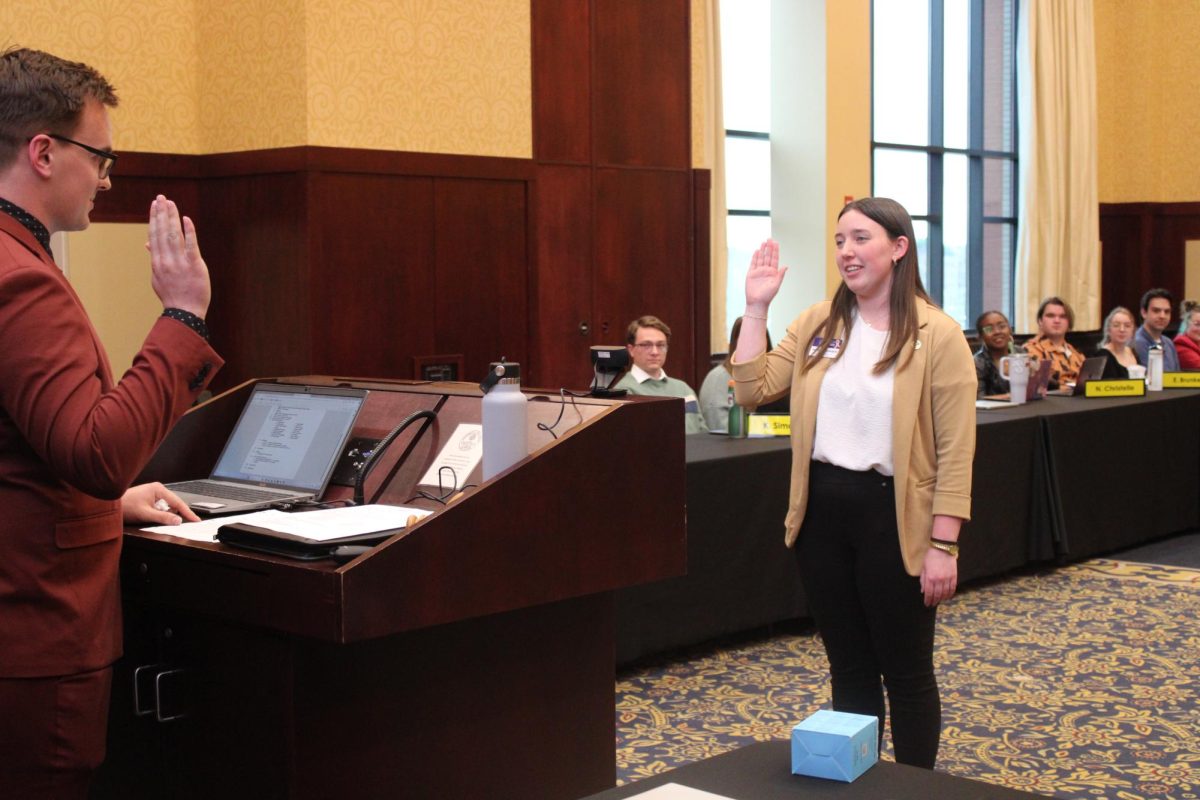The stage at Wednesday’s Student Senate presidential debate looked a little bit like an orderly line from kindergarten: boy, girl, boy, girl, boy, girl – the male presidential candidates lined up with their female running mates to their left.
And although outgoing Vice President Kate Demerse said the clear gender line between this year’s candidates – three men running for president, three women for vice president – is a cause for concern, she also said each ticket has the potential to define its own leadership roles, regardless of gender.
Demerse and Senate President Adrian Klenz “have always approached this job as a team effort,” she said after the debate. “The personalities define the job.”
| “You want to believe it’s an equal world. But women aren’t involved in politics as much as they should be.” –Sarah Schuh Former Student Senate President |
Male Senate presidents are nothing new. In the past 15 years, only three women have served as Senate president. When senior Sarah Schuh won the 2002 election, she became the first female president since 1993. By contrast, 11 women have served as vice president since 1989. On two occasions, men held both offices; every other time, the tickets featured one man and one woman.
Klenz and Demerse have had the same level of responsibility throughout their tenure, Demerse said, although the responsibilities themselves differ because of their respective strengths and weaknesses.
“Adrian is the pro public speaker,” she said. “I’m the caregiver.”
All three of this year’s vice presidential candidates – juniors Meredith Marx and Lindsey Nelson and junior Dawn Snyder – said their administration would be more of a partnership than a hierarchy, employing equal responsibility between the president and vice president.
Nelson even referred to the idea of a “co-presidency” between her and junior Bob Bourgeois, her running mate.
“The initial plan was for me to run as president and him as vice president,” Nelson said.
But when Nelson made the decision to study abroad in South Africa during the summer, she and Bourgeois decided he should run because he’d be around for Senate business during the summer months.
Snyder said her choice to run for vice president, rather than president, can be attributed to personality, not gender. She also stressed an equal partnership with her running mate.
“We’re a team,” Snyder said. “I can’t do this without him and he can’t do this without me.”
While she’d like to see more women in the Senate president position, Snyder said the situation is improving. Whereas during the mid-1990s, Senate’s executive board had only one woman, she said this year’s board has seven women and six men.
Demerse said she encountered sexual discrimination, albeit indirectly, when she ran for vice president a year ago. A few students approached Klenz and asked him which one of them was running for president. They told Klenz they wouldn’t vote for a woman, she said.
Schuh didn’t worry about whether her gender would influence student votes. But it puzzles her that on a campus that is about 60 percent female, more women haven’t served as Senate president.
Women bring a much-needed perspective to a Senate presidential ticket, Schuh said.
“I think a male-female ticket is a strong ticket,” she said. “The women aren’t just women who are pretty and have nothing to back it up.”
Schuh’s peers encouraged her to run, and she felt confident in her skills and experience, she said.
For Demerse, one of the best ways for women in politics to combat sexism is on the job.
“(Women should) lead by example,” she said. “I don’t want this to become an all-out gender war.”
The gender imbalance is indicative of a problem that persists at all levels of politics, Schuh said.
“You want to believe it’s an equal world,” she said. “But women aren’t involved in politics as much as they should be.”






